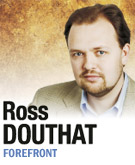Subscriber Benefit
As a subscriber you can listen to articles at work, in the car, or while you work out. Subscribe Now
 There is a conceit, especially popular among the press corps, that the salvation of America depends exclusively on self-described moderates and centrists. If there’s a path out of gridlock and insolvency, this theory goes, it can’t be charted by consistent conservatives or liberals.
There is a conceit, especially popular among the press corps, that the salvation of America depends exclusively on self-described moderates and centrists. If there’s a path out of gridlock and insolvency, this theory goes, it can’t be charted by consistent conservatives or liberals.
Instead, the nation needs the leadership of ideologically flexible, politically ambidextrous mavericks, Democrats like Evan Bayh, perhaps.
This vision doesn’t leave much room for a figure like Tom Coburn, Oklahoma’s junior Republican senator. Coburn came to Washington as a congressman in 1994, and distinguished himself by remaining incorruptibly right-wing. Since his 2004 election to the Senate, he’s remained a conservative’s conservative, equally resolute in his opposition to earmarks, Obamacare and abortion.
But in the last two years, Coburn has also proved himself braver than many of his colleagues, more creative on public policy, and more intellectually honest about the consequences of popular legislation.
His example suggests that America may be saved from fiscal ruin, not by politicians who trim their sails at every opportunity, but by lawmakers with stiff backbones and unwavering convictions.
In the health care debate, for instance, it was Coburn who co-sponsored (with the ubiquitous Paul Ryan in the House) the only significant conservative alternative to the Democratic bill. Their Patients’ Choice Act was arguably a more “extreme” proposal than the milquetoast reforms Republicans rallied around, but it was also a more serious proposal, with a real chance of reducing costs and expanding insurance.
Then came the financial reform debate, in which Republicans accused Democrats of perpetuating “too big to fail,” but offered counterproposals that often looked like business as usual for the financial industry. Coburn voted for an amendment proposed by two Democrats, Ohio’s Sherrod Brown and Delaware’s Ted Kaufman, that would have taken the “extreme” step of capping the size of America’s largest banks.
“Capitalism works as long as you don’t have monopolies,” Coburn told me last week. His ideological rigor enabled him to consider the possibility that what was branded as a left-wing idea might actually be better for free markets than another round of regulation.
But Coburn’s most important vote was cast as a member of the White House’s deficit commission, when he chose actual fiscal conservatism over his party’s interest groups by voting to forward the panel’s recommendations to Congress for debate.
Interestingly, the Oklahoma senator was joined in his “yes” vote by the staunchly liberal Sen. Dick Durbin of Illinois. Asked about their unlikely convergence, Coburn said, “if you’re a hard-core liberal, and you want the government to do all these things that I would contend are outside the realm of the enumerated powers—well, if we’re bankrupt we’re certainly not going to be doing it to the level that we’re doing it today.”
It’s also possible that political moderates, because their convictions are thinner and their electoral positions more precarious, aren’t always the best people to forge bargains that require shared sacrifices.
The tax cut deal is a case in point. In a sense, it’s a triumph for the political middle. If it passes, it will do so with the votes of Democratic moderates, while the president’s liberal caucus howls in protest.
But the lamenting liberals will have a point. Absent a plan to stabilize America’s debt, the deal is a remarkable exercise in “moderate” irresponsibility. In essence, the President acceded to the Republicans’ desire to extend the current deficit-financed tax rates … in exchange for hundreds of billions more in deficit-financed spending and tax cuts. Everyone won—except the U.S. Treasury.
Or as Coburn put it on the Senate floor, , the bargain could easily become another example of how “both parties have laid a trap for future generations by our inaction, our laziness, our arrogance, and a crass desire for power.”
That’s extreme language. And we need more of it.•
____________
Douthat is a New York Times op-ed columnist. Send comments on this column to [email protected].
Please enable JavaScript to view this content.
